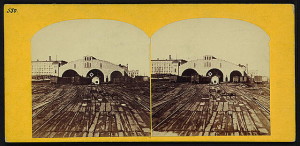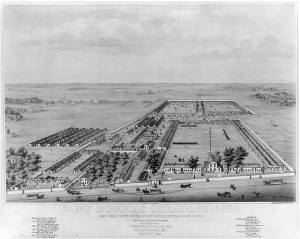Shelby Foote said that after President Lincoln wrote his prediction of electoral defeat and pledge of co-operation with the incoming administration, he folded it shut, brought it to a cabinet meeting, and had each of the attendees sign it – without telling them what it contained. However, he thought things would get a bit better after the Democrat Convention in Chicago because
he saw trouble for his opponents once they came out in the open, where he had spent the last four years, a target for whatever mud was flung. The Old Democratic rift, which had made him President in the first place, was even wider than it had been four years ago … The front runner was Major General George B. McClellan, who was expected to attract the soldier vote, although numbers of Democrats were saying that that they would accept no candidate “with the smell of war on his garments.” Either way, as Lincoln saw the outcome, platform and man were likely to be mismatched, … “they must nominate a Peace Democrat on a war platform, or a War Democrat on a peace platform,” he told a friend who left that weekend for the convention in his home state, “and I personally can’t say I care much which they do.” [1]
A Richmond paper’s coverage of the first day of the convention contained a telegram published originally in The New-York Times that seemed to agree with Mr. Lincoln: “The peace men will construct the platform, and then consent to set little “Mac” upon it.”
From the Richmond Daily Dispatch September 3, 1864:
The first day of the Chicago Convention.
The Chicago Convention met on the 29th, and the New York papers of the 30th are full of what was said and done there. We copy such of the preliminary proceedings as are interesting. Governor Seymour, of New York, withdrew his name on the 28th positively, and the New York delegation, then being polled, stood: For McClellan, 53; scattering, 13. Ohio delegation: McClellan, 16; against him, 26. Missouri: McClellan, 13; scattering, 9. Indiana: McClellan, 18; scattering, 6. Illinois: McClellan, 22; scattering, 10. Betting was freely done at four to one that McClellan would be nominated on the first ballot. At 12 o’clock on Monday the Convention was called to order by Auguste Belmont in a short address, in which he said:
The past and the present are sufficient warnings of the disastrous consequences which would befall us if Mr. Lincoln’s re-election should be made possible by our want of patriotism and unity. The inevitable results of such a calamity must be the utter disintegration of our whole political and social system, amid bloodshed and anarchy, with the great problems of liberal progress and self-government jeopardized for generations to come. The American people have at last awakened to the conviction that a change of policy and administration can alone stay our downward course; and they will rush to the support of your candidate and platform, provided you will offer to their suffrages a tried patriot who has proved his devotion to the Union and the Constitution, and provided that you pledge him and ourselves to maintain their hallowed importance by every effort and sacrifice in our power.
He nominated Ex-Governor Bigler, of Pennsylvania, for temporary President, and the nomination was carried. Ex-Governor Bigler, on taking his seat, made what might be called in peace times a “Union” speech, saying a great deal about the North, South, East and West rallying under the Constitution, (what Constitution?) which is of no interest to our readers in the Confederacy. After the appointment of the proper committees, various resolutions were read and referred. Among them was one by Governor Hunt, of New York, for a convention of all the States; one by Mr. Long, of Ohio, asking Lincoln to suspend his draft for 500,000 men until after the Presidential election; one by Mr. Price, of Missouri, pledging all the (United) States to stand by each other if the “rights” of any one are trampled on by Lincoln; and the last one by Mr. Allicks, of Pennsylvania, re-affirming the Monroe doctrine!! The Convention then adjourned till the next day. A telegram from Chicago, in the New York Times, dated the 29th, says:
As yet, little or no difference of opinion is manifested as to the character of the platform. An armistice, a convention of the States, and the adoption of every means consistent with Christianity and civilization to bring about a permanent and honorable peace, seem to be the points generally agreed upon by all the delegations.
The streets and squares about the principal hotels have been filled with immense through all the evening, and at this late hour clubs are marching, bands playing, and large meetings are being held at several points.
The excitement grows more intense as the final action of the Convention is neared.
To-night the committees on resolutions and on organization and rules are in session.
Many of the great lights of the party are here, and the wires are being industriously pulled. Vallandigham is here, and excites as much curiosity as a loosed elephant would in our streets. Crowds follow him wherever he goes — they enter his hotel with him, and are clamorous for a speech. Loyal men are indignant that such an arch traitor is permitted to stalk through our streets, trampling upon the authority of the Government and defying its power.
All shades of the Democracy are here. But it is evident, even now, that the positive men–the Woods and Vallandigham — will control the Convention. The peace men will construct the platform, and then consent to set little “Mac” upon it. I am convinced that he has the inside track, and that he will be nominated by a large majority. I may be mistaken, but such are the indications now.
My old Free Soil Barn-burning friend, Dean Richmond, is on hand. He pleads rather faintly for a vigorous prosecution of the war; but Wood’s voice is in the ascendant now, and Dean will have to take a lower seat.
As to the platform, that has already been foreshadowed. They will resolve for an armistice — just what the rebels want, in their present condition, in order to recruit their armies and fill up their exhausted commissariat. Then they will resolve for a national convention to adjust matters, and here they will stop. They know that no adjustment short of recognition of the independence of the South can take place, and they know that an armistice would be greatly to the advantage of the rebels, and hence they favor it.
Mr. Fillmore’s strength in the Convention will be confined to those States in which there are but few foreigners. In the West his Know-Nothing record of 1856 would ruin him, and it will throw him out of much strength he would otherwise have in the Convention.
There are two delegations from Kentucky, one called the Bramlette delegation, and the other the Powell and Wickliffe delegation. Considerable of a fight is expected in the Convention on the question of the admission of one or the other of these.
The war-horses of the party are already on the ground. Old Sam. Medary and Cox, of Ohio; Guthrie, Robinson, and several others, from Kentucky; Richmond, the Woods, Belmont, McKcon, Seymour, and a host of lesser lights, from New York; Dana, from Maine; J. Glancey Jones, of Pennsylvania; Ex-Governor Campbell, S. R. Peyton and others, of Tennessee, and Rice, of Minnesota. Of course, it is such men who do all the managing — all the wire-working and thimble-rigging for the concern, who are, in fact, the party — the balance of the Convention being merely on hand for show, for ornament, and not for use. At the present writing, I do not anticipate any serious dissentious in the Convention. The leaders have the party too well drilled for that. There may be some sparring, as between lawyers; but I look for nothing more. I may be found to be mistaken when the curtain lifts, but I think not.
Vallandigham is holding forth to a crowd in the Court-house square. Of course he is constantly cheered, and is evidently the lion of the day, and Fernando Wood is lion No. 2.
There is a feverish anxiety all over the city — especially among the woman. There are so many stories afloat as to the purpose of the Copperheads that it creates much excitement. It is feared that one part of the plot is to release the rebel prisoners in Camp Douglas, in which case all expect the city to be fired and plundered. The authorities have some misgivings, as the wives and families of all the officers have been removed from the camp, and this fact adds to the uneasiness. And then the seizure of arms at Indianapolis, and the general belief that the Irish are armed here, adds not a little to the general concern. Never was a political convention held in this country around which cluster so many omens of evil.
But my opinion still is that there will be no disturbance. The leaders are not prepared for this step yet, at least.
____________________________________________________
____________________________________________________
War and peace; Democrats meet in Chicago; “a feverish anxiety all over the city”; welcome to the 1968 Democrat National Convention
- [1]Foote, Shelby. The Civil War, A Narrative. Vol. 3. Red River to Appomattox. New York: Random House, 1986. Print. pages 550-551.↩


